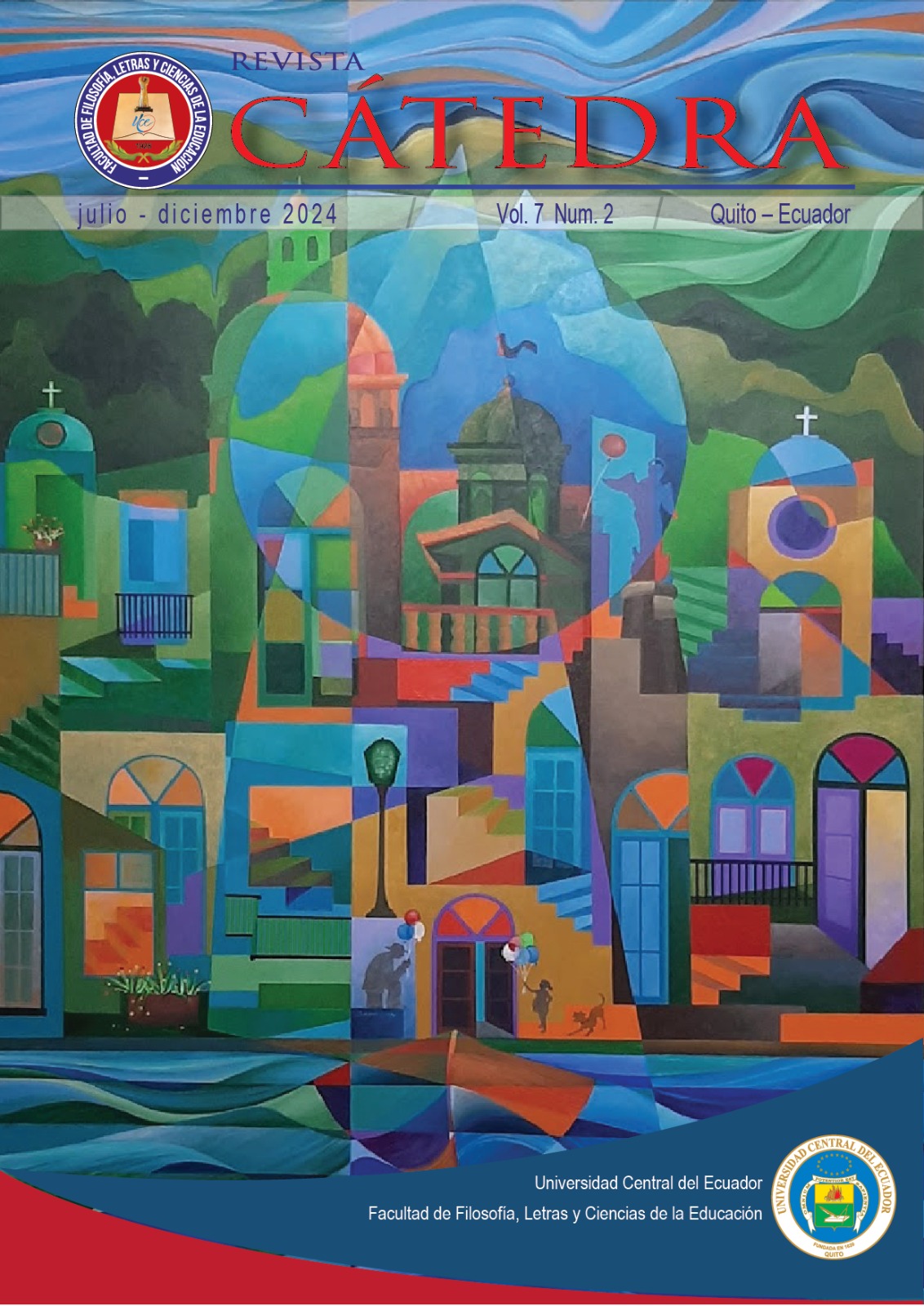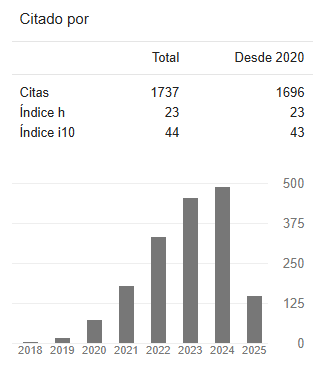Gender and education In África: the case choice of the choice of baccalaureate studies in Ecuatoguinean educational centers
DOI:
https://doi.org/10.29166/catedra.v7i2.6252Keywords:
baccalaureate, educational centers, education, gender, specialtyAbstract
This research focuses on the gender and education approach in Africa, as one of the main scenarios where the difficulties of access to education are registered, prioritizing more the training of boys to the detriment of girls. In order to better understand this issue, the analysis is focused on the specific case of the choice of high school studies in Equatoguinean schools. There is evidence of a division of the student body when it comes to choosing the branches of the baccalaureate, with students opting for the science or technology branch, while female students opt for the arts or humanities. As for the methodological aspects, the use of descriptive research based on the quantitative method was deemed necessary. This was chosen because the object of study is expressed in percentages. The population studied is Equatorial Guinea with a representative sample made up of educational centers under study, such as the Colegio Privado Nuestra Señora de Bisila de Nkolombong; Centro Educativo Madre Catalina II; Centro Privado la Divina Pastora; INES Carlos Lwanga; INES Padre Joaquín María Sialo, all in the city of Bata (mainland). And the Nostradamus Private Center of the city of Malabo (insular part). One of the main conclusions is that girls opt more for the letters branch because hypothetically, this is related to feminine stereotypes, i.e. easy. Therefore, it is recommended to the students to show their cognitive skills regardless of sex.
Downloads
References
Akkari, A. (2011). La escuela en el Magreb. Un desarrollo inacabado. Icaria/Antrazyt.
Begné, P. (2011). Acción afirmativa: una vía para reducir la desigualdad. Ciencia Jurídica, 1(1), 11-16. DOI: https://doi.org/10.15174/cj.v1i1.74 DOI: https://doi.org/10.15174/cj.v1i1.74
Bidaurratzaga Aurre, E. (2012). Logros, limitaciones y retos del desarrollo humano en el ámbito de la educación en África Subsahariana. Foro de Educación, 14(1), pp. 27-40. https://dialnet.unirioja.es/descarga/articulo/4171870.pdf
Buquet Corleto, A. G. (2016 ). El orden de género en la educación superior: una aproximación interdisciplinaria. Nómadas 44(1), 27-43. https://www.redalyc.org/pdf/1051/105146818003.pdf DOI: https://doi.org/10.30578/nomadas.n44a2
Dyombe, M. E. (2009). El sistema educativo en Guinea Ecuatorial. Educación y Futuro Digital, http://www.cmeyanchama.com/Documents/Guinee/marlene_Educacion_en_Guinea.pdf.
González Pérez, M. I., y Ledesma Reyes, M. (2015). Mujeres africanas y educación superior: Políticas Educativas favorables a la igualdad de género en África Subsahariana. Journal of Supranational Policies of Education 3(1), 156-183. http://hdl.handle.net/10486/667462. DOI: https://doi.org/10.15366/jospoe2015.3.009
Herrera Santana, A., Pulido, J. R., y Rodríguez, J. A. (2017) Las Áfricas y la gestión de los centros educativos. Humania del Sur: Revista de Estudios Latinoamericanos, Africanos y Asiáticos, 12(22), 117-130. https://dialnet.unirioja.es/servlet/articulo?codigo=6215932&orden=0&info=link
Maquieira, V. (2001). Género, diferencia y desigualdad. En E. Beltrán e V. Maquiera (Eds.), Feminismos. Debates teóricos contemporáneos. Alianza Editorial. pp. 127-190.
Martínez Martín, I. (2015). Repensar la educación y el desarrollo africano en clave de género:estudio centrado en el estado de la educación en Mozambique. International Journal for 21st Century Education, 2(1), 69-77. https://dialnet.unirioja.es/servlet/articulo?codigo=5593174&orden=0&info=link DOI: https://doi.org/10.21071/ij21ce.v2i1.4262
Meena, R. (2009). La participación de las mujeres en los niveles de educación superior. IEPALA.
Morgade, G. (2001). Aprender a ser mujer. Aprender a ser varón. Novedades Educativas.
Nguema-Nkié, C. E. (2022). Educación escolar para el desarrollo social y económico en Guinea Ecuatorial. Revista Cátedra, 5(2), 138-156. DOI: https://doi.org/10.29166/catedra.v5i2.3394. DOI: https://doi.org/10.29166/catedra.v5i2.3394
Ordorika, I. (2015). Equidad de género en la Educación Superior. Revista de la Educación Superior, XLIV, (2)(174), 7-17. https://www.redalyc.org/articulo.oa?id=60439229001. DOI: https://doi.org/10.1016/j.resu.2015.06.001
Palomar, C. (2005). La política de género en la educación superior. La Ventana, 21(1), 7-43. https://www.redalyc.org/pdf/884/88402101.pdf
Rodríguez Menéndez, M. D., Torío López, S., y Fernández García, C. M. (2006). El impacto del género en las elecciones académicas de los estudiantes asturianos que finalizan la eso. Revista Española de Orientación y Psicopedagogía, 17(2), 239-260. https://www.redalyc.org/pdf/3382/338230775007.pdf DOI: https://doi.org/10.5944/reop.vol.17.num.2.2006.11351
Santana Vega, L. E., Feliciano García, L., y Jiménez Llanos, A. (2012). Toma de decisiones y género en el Bachillerato. Revista de Educación, 359(1), 357-387. DOI: 10.4438/1988-592X-RE-2011-359-098.
Sanz Martín, P. A. (2011). De la educación tradicional africana a la escuela actual en áfrica subsahariana. Tabanque Revista Pedagógica, 24 (1), 53–68. https://dialnet.unirioja.es/descarga/articulo/3900961.pdf
Tamayo y Tamayo, M. (2003). El proceso de la Investigación Científica. Incluye evaluación y administración de proyectos de investigación. Limusa, S.L.
UNESCO. (2009). Indicadores de la Educación. Especificaciones técnicas. Ediciones UNESCO.
UNESCO. (2012). Atlas Mundial de la igualdad de género en la educación. Ediciones UNESCO.
UNESCO. (2014). Informe de Seguimiento de la EPT en el mundo 2013-14. Enseñanza y Aprendizaje: Lograr la calidad para todos. Resumen sobre género. Ediciones UNESCO.
Wabgou, M. (2019). Problemáticas educativas en las universidades africanas: La academia subsahariana frente a la globalización. Acción y Reflexión Educativa, (44), 104-123. http://portal.amelica.org/ameli/jatsRepo/226/226955007/.
Zapata, E., y Ayala, M. (2014). Políticas de equidad de género: Educación para una escuela libre de violencia. Ra Ximhai, 10(7), 1-21. https://www.redalyc.org/pdf/461/46132451001.pdf DOI: https://doi.org/10.35197/rx.10.03.e3.2014.01.ez









